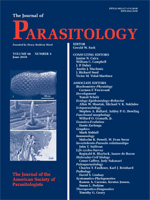Trypanosoma cruzi, the etiologic agent of Chagas' disease, is enzootic in animal populations of the southeastern United States. In the United States, T. cruzi prevalence has been reported for over 20 different wildlife species, and 7 autochthonous human cases have been documented since 1955. Previous canine (Canis familiaris) serosurveys have been limited either by small sample size or confined geographic reporting areas. In this study, we report a seroprevalence of 6.4% among 860 canines from 31 counties and 5 ecoregions throughout Tennessee, using an indirect immunofluorescent assay (IFA). Statistically significant associations between seropositivity and age, weight, and outdoor living were noted. Differences in seropositivity were not seen based on American Kennel Club (AKC) group, sex, habitat, land cover, and ecoregion. Greater attention should be given to possible T. cruzi transmission in Tennessee and veterinarians should consider Chagas' disease as a differential diagnosis with compatible signs.
How to translate text using browser tools
1 June 2010
Factors Associated with Trypanosoma cruzi Exposure Among Domestic Canines in Tennessee
Meghan E. Rowland,
Jenny Maloney,
Sara Cohen,
Michael J. Yabsley,
Junjun Huang,
Melissa Kranz,
Alice Green,
John R. Dunn,
L. Rand Carpenter,
Timothy F. Jones,
Abelardo C. Moncayo
ACCESS THE FULL ARTICLE

Journal of Parasitology
Vol. 96 • No. 3
June 2010
Vol. 96 • No. 3
June 2010




